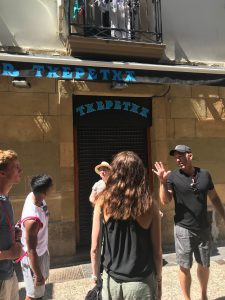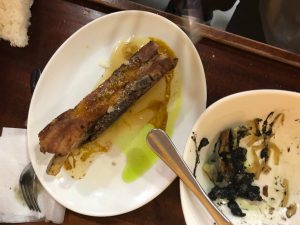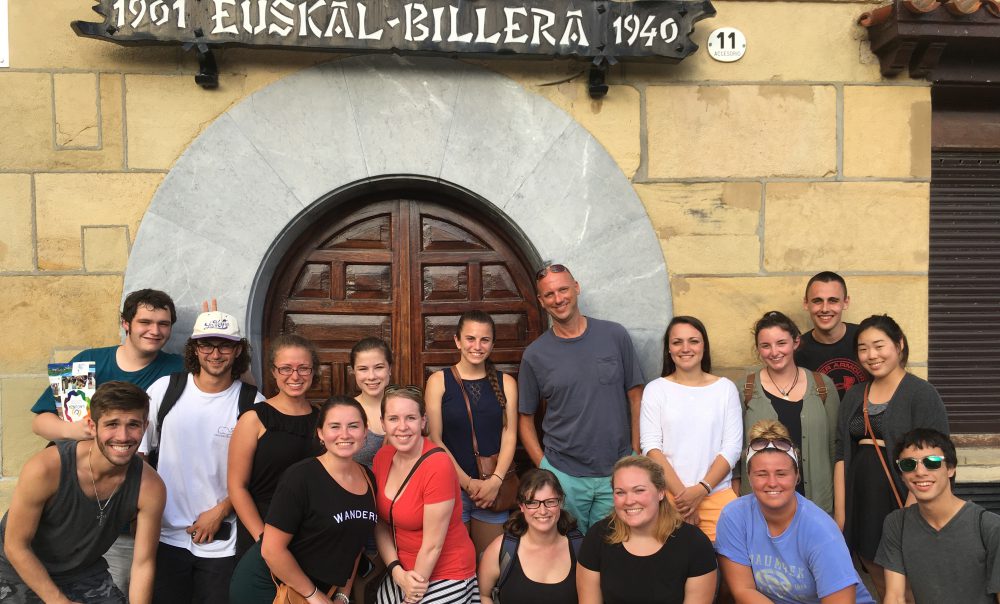All of my previous knowledge of food, culture, and social interaction has been thrown away and rewritten over the past few days. In America, we tend to treat food as a time-sensitive objective at specific hours of the day. We eat quickly to save time. We eat alone to save time. We eat the lowest quality foods to save time. Our dinner tables are outside the house so that we are together yet still alone. Tables inside the house are quiet, small, and often filled with technology. We rarely know anything about the lives of our neighbors except for passing glimpses. In essence, we put aside wholesome enjoyment for the sake of convenience.

After just a brief tour of la Parte Vieja yesterday, I can confidently say that the Basques treat food, culture, and brotherhood as it should be treated. There are more Pintxo bars than one could possibly explore in even a week. Our three hour two just barely scraped the surface of the culture that lives in the Spanish Basque region. Our tour, of course led by Professor Julien Zabalbeascoa, the Basque man himself, took us to some of the most famous Pintxo bars in the city and showed us classic Basque dishes and Pinxtos as well as some of Julien´s personal favorites. Our Pintxo tour started with Txakoli, a classic Basque white wine. The wine is poured from high in the air (as pictured below) to break and aerate the wine against the glass.

It was incredible to be able to experience the culinary genius and creativity of the Basques. Every dish put in front of us was a masterpiece there to savor, not to have for the purpose of convenience. The original pioneers of the Pinxtos and many of the dishes still served today were Basque chefs who trained in France with the greatest culinary minds in the world. They brought the techniques back from France and added local ingredients and inspirations to create a new lifestyle revolving around food and friends.
The meats in every Pintxo were cooked to perfection. One of the best dishes of our tour was a pork rib (pictured below) that fell apart in your mouth. It may simply be the quality of the local ingredients, or perhaps a Basque secret for cooking meats, but these dishes could not have been any better. An explanation for the quality of the meats is that the animals that end up on the plates are all free range. Each dish is made with only the highest quality ingredients. This is not the easy way, but the Basque are not willing to sacrifice quality for convenience.

After grazing through the Pintxo bars in la Parte Vieja, we can understand the lifestyle that the Basque try to live, and we can get a taste of the most important values in their culture. As I mentioned, quality is key. Every dish´s presentation is important as well as the taste. Innovation with traditional ties is also an important value. There are many Pintxo bars who continue to add new, crazy Pintxos to the menu. One example of this is ox tail shaped and glazed like a brownie with whipped cream on the side.
One of the things that has never changed is the way in which the Basque go about the Pintxo bars. Basques like to meander from one Pintxo bar to the next having only a drink and a couple Pintxos at each one. The experience is meant to be a social one in which you interact with the friends you are with as well as those around you. It is apparant that those in this area are not introverted. People enjoy talking about the latest soccer match or the newest politcal story. Going out for Pintxos is also not a rushed event. People take their time enjoying every aspect. The same values can be seen in the siesta. Between two and four pm, shops close and people will rest or often times go to the bars.

The mentality of the Basque is almost an extreme opposite of the mentatlity we see in the United States. In terms of food, we care much less about the quality of the ingredients. We would rather have more food that we can buy and eat as quickly as possible to fit into the busy schedules we create for ourselves. We value long hours of hard work rather than a healthy mental and physical state. I believe that the Basque emphasis on quality, leisure, family, and community creates a more balanced life.
